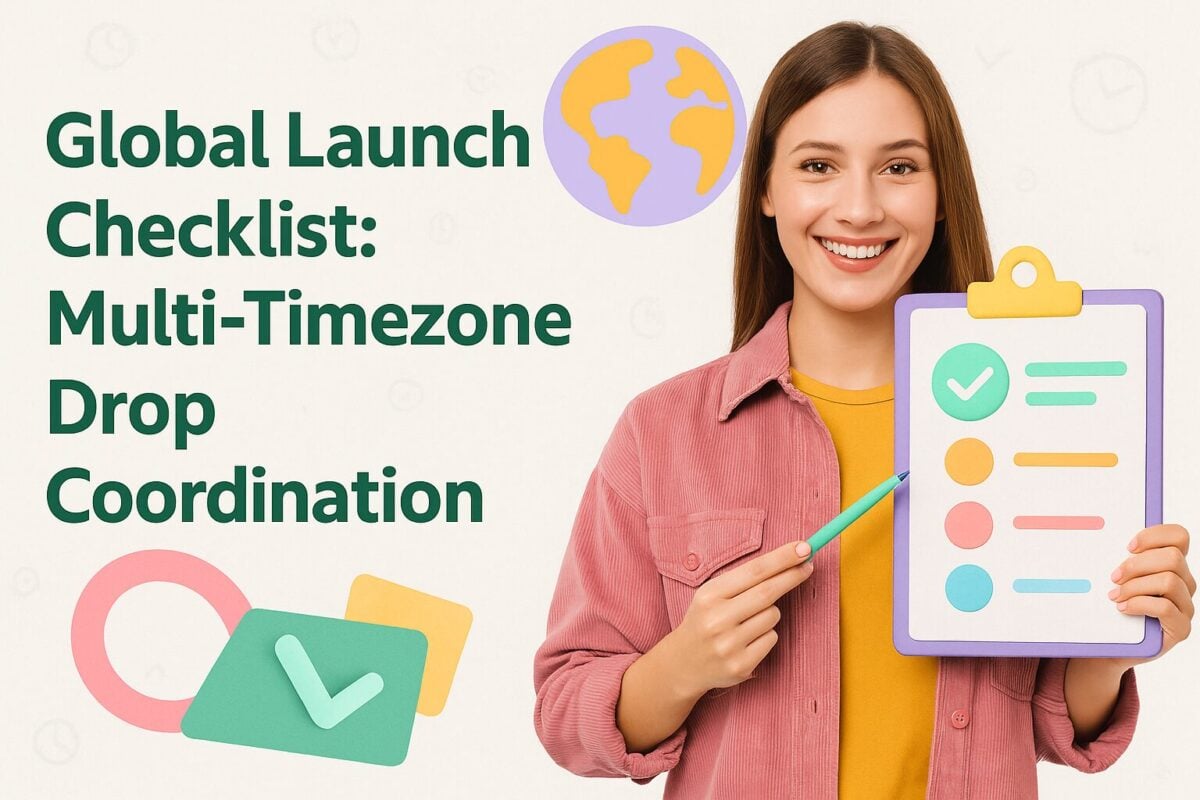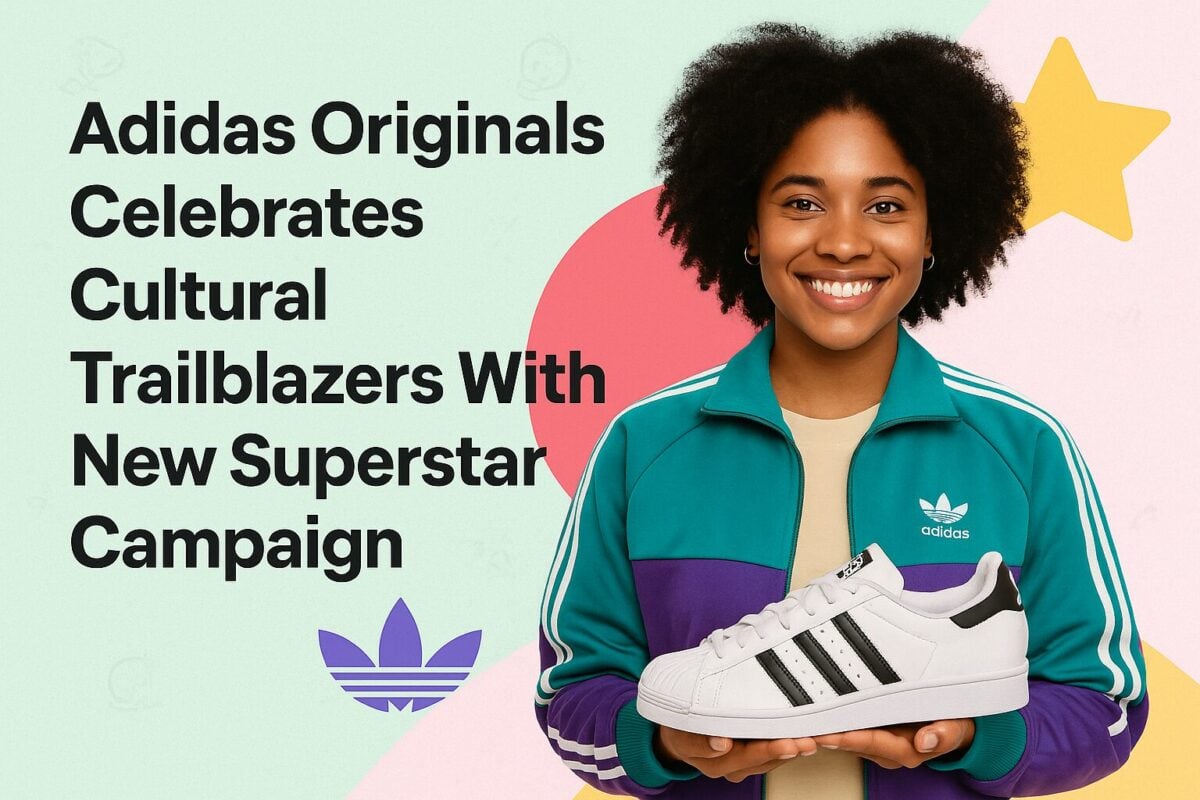Consumers are becoming more aware of brands’ ethical responsibility. Though, this responsibility doesn’t just refer to how brands interact with their target audiences. It also extends to how they treat their very own. In addition to the price tag of products, consumers are also becoming concerned about the human costs involved.
Embracing diversity and inclusion in the workplace is much more than just window dressing to keep your customers happy. If you create an environment where all employees feel welcome and safe, they’ll feel happier. This will translate into an improved performance which will lead to higher revenue.
Sure, the potential to create more revenue is an attractive carrot to dangle in front of management’s nose. However, you shouldn’t need the incentive to create a workplace that’s more diverse and inclusive. It’s the right thing to do.
If you need to help your department in that department, here are 14 of the leading workplace influencers to check out. As this article is all about diversity, equity, and inclusion, we tried to include workplace influencers from various backgrounds.
Diversity and Inclusion Workplace Influencers to Follow:
- 1. Stacia Sherman Garr, Co-founder of RedThread Research
- 2. Aaron Rose, Inclusive Culture Consultant
- 3. Marianne Cooper, Senior Research Scholar at Stanford University
- 4. Lily Zheng, DEI Strategist and Consultant
- 5. Candice Morgan, Equity, Diversity & Inclusion Partner at GV
- 6. Sarah Saska, CEO at Feminuity
- 7. Tariq Meyers, Co-founder and co-CEO of Untapped
- 8. Cynthia Owyoung, Founder and CEO of Breaking Glass Forums
- 9. Ryan Carson, Founder of multiple companies
- 10. Joelle Emerson, Founder and CEO at Paradigm
- 11. Aubrey Blanche, Founder and CEO of The Mathpath
- 12. Tony Prophet, Board Member of Dolby Laboratories
- 13. Lesa Bradshaw, Diversity and Disability Inclusion Expert
- 14. Max Masure, Justice, Equity, Diversity, and Inclusion Consultant
- Frequently Asked Questions
14 Workplace Influencers to Know
1. Stacia Sherman Garr, Co-founder of RedThread Research
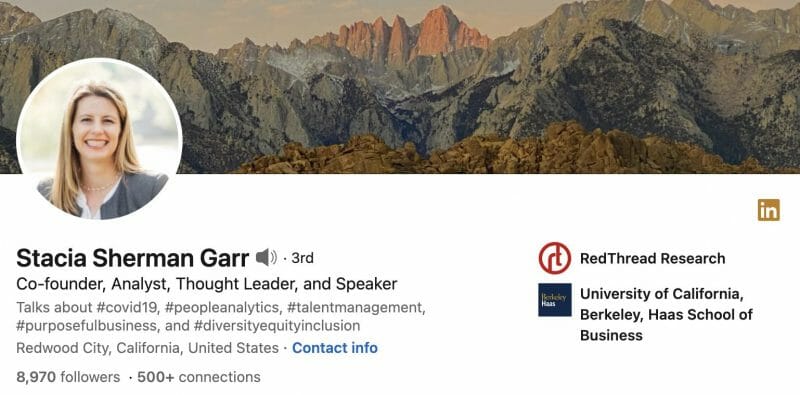
Source: linkedin.com
Stacia co-founded RedThread Research, a human capital research and advisory membership, in 2018. Here, she’s also a principal analyst helping to gather data and insights that leaders and tech vendors can use to reach better decisions and create better products.
On LinkedIn, where she has more than 8,000 followers, she mostly talks about talent management, people analytics, purposeful business, and diversity, equity, and inclusion. As a regular speaker and writer, her work has also landed her recognition from leading publications like Forbes, The New York Times, and The Wall Street Journal.
She’s focused on how various technologies can help us to create more inclusive workplaces by, for example, removing gender-biased language from job descriptions. By focusing on talent technology, she helps businesses to find a better way to work.
So, if you want to embrace HR technology, be sure to connect with her on LinkedIn or Twitter.
2. Aaron Rose, Inclusive Culture Consultant
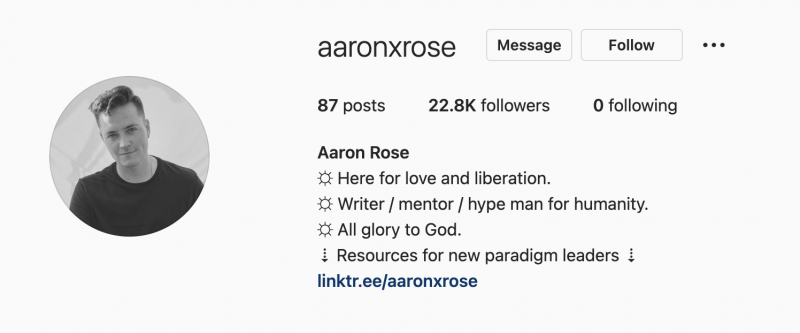
Source: instagram.com
Aaron Rose describes himself as an inclusive culture consultant, transformational coach for public figures, and “a hype man for humanity”. Driven by his own experiences of discrimination, he started working as a community organizer and educator.
For the past decade, he has focused on addressing separation and political polarization by creating radically inclusive community cultures and empowering the next generation of changemakers. Through writing and talks, he shares hopeful messages and transformation tools that can support public figures to own their voice on social problems. He also helps companies with their internal cultures and can advise on communication relating to conscious culture, identity, and conflict transformation.
Unlike many of the workplace influencers that are regular LinkedIn posters, Aaron is mostly active on Instagram where he has over 20,000 followers. From finance to wellness, he has helped various industries and a number of major businesses that include the likes of Columbia University and McKinsey & Company.
3. Marianne Cooper, Senior Research Scholar at Stanford University
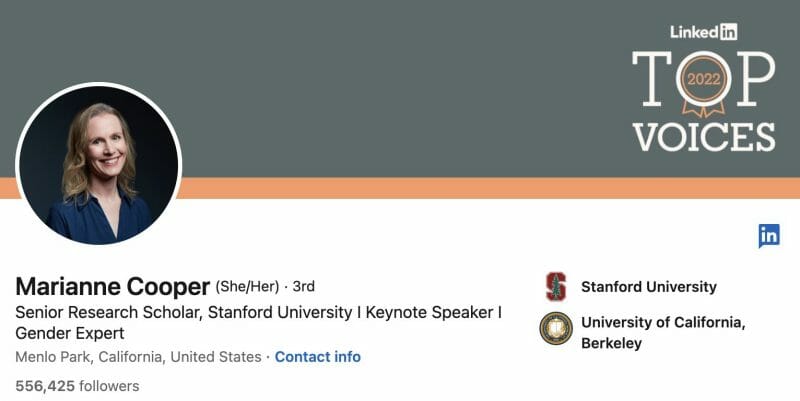
Source: linkedin.com
Marianne wears many hats. She’s a sociologist, expert adviser, writer, and a speaker. In her role as senior research scholar at Stanford VMware Women’s Leadership Innovation Lab, she completes research on a number of critically important topics that include gender, financial insecurity, and economic inequality.
Though, her impact stretches far beyond merely research on inequality and gender and she has a collection of publications behind her name. She, for example, has served as a lead researcher on Lean In and McKinsey & Company’s Women in the Workplace reports since 2015.
With over half a million followers on LinkedIn, Marianne is one of the leading LinkedIn influencers. Here, she shares valuable insights and contributions on women's leadership and various other related topics.
4. Lily Zheng, DEI Strategist and Consultant
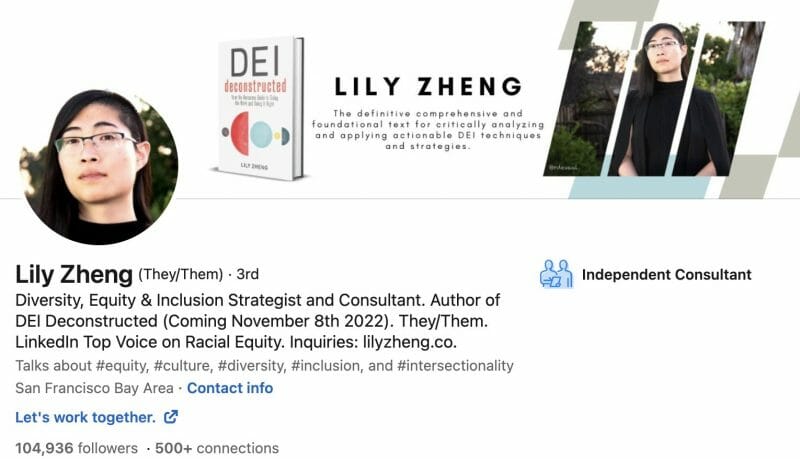
Source: linkedin.com
Lily (they/them) is an independent diversity, equity, and inclusion strategist and consultant, professional speaker, and author. They’ve also partnered with Stanford DGen Office helping them with design and research to create new tools and metrics for evaluation. While working as a design and evaluation associate at Stanford, Lily also trained hundreds of students and staff members on gender diversity and how to engage with difference.
On LinkedIn (where they’ve been named as a Top Voice on racial equity), they often post about culture, intersectionality, and inclusion. When it comes to talking and writing about DEI, Lily takes a no-nonsense approach telling it as it is.
If you prefer long-form content over LinkedIn posts, you can also check out The Ethical Sellout: Maintaining Your Integrity in the Age of Compromise that Lily co-authored with Inge Hansen. Another book that deconstructs DEI is also due to be released in November 2022.
5. Candice Morgan, Equity, Diversity & Inclusion Partner at GV
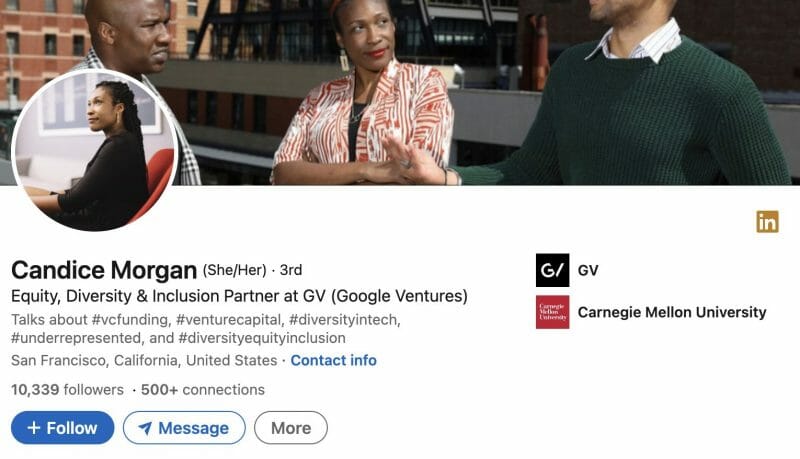
Source: linkedin.com
Candice (she/her) is no stranger to taking charge when it comes to creating programs and strategies focused on diversity and inclusivity. Before joining GV (previously called Google Ventures) to help them with inclusive strategies and expanding diversity across the entrepreneurs they fund, she was the Head of Inclusion and Diversity at Pinterest.
In addition to DEI, she also talks about venture capital, diversity in tech, and underrepresentation. Some of her other specialties include workforce statistics analytics, cross-cultural management, as well as qualitative and quantitative analysis.
So, for advice on how investors and startups can create a more equitable environment, be sure to follow her on LinkedIn and Twitter. She has successfully helped several startups to create more inclusive products and workplaces.
6. Sarah Saska, CEO at Feminuity
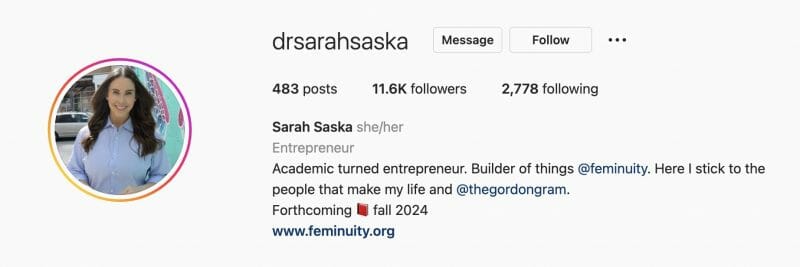
Source: instagram.com
Dr Sarah Saska (she/her), is an academic turned entrepreneur who co-founded Feminuity, a full-service DEI firm in 2015. In her previous role as an academic, her work also focused on equity when she led doctoral research about the need for tech that’s been designed ethically and equitably. Her other areas of specialization include gender studies, gender-based violence, and trans studies.
Together with her team, they help leading tech companies to incorporate diversity, equity, and inclusion into their business. From building diverse teams to implementing equitable systems to designing inclusive products, she tackles various key aspects.
7. Tariq Meyers, Co-founder and co-CEO of Untapped
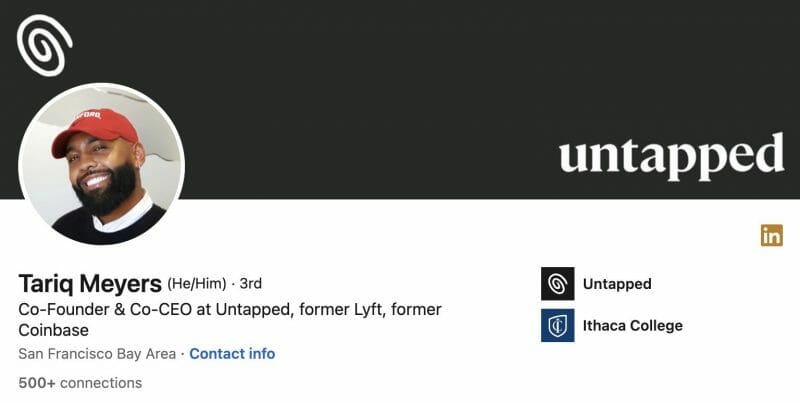
Source: linkedin.com
Before starting Untapped, a diversity and inclusion podcast, Tariq (he/him) headed inclusion and diversity at both Lyft and Coinbase. During his time at Coinbase, he was also tasked with the responsibility of leading the employee support task force to help them prepare for the future of work in light of Covid.
He’s passionate about helping mission-driven brands create more chances for employees who’ve been left out historically by implementing equitable policies and practices. On his podcast, he explores topics like gender identity in the workplace, creating an inclusive environment for transgender employees, and actionable ways to promote disability inclusion.
Even if you aren’t necessarily interested in following Tariq, be sure to tune into his podcast episodes during which he interviews other influential DEI leaders.
8. Cynthia Owyoung, Founder and CEO of Breaking Glass Forums
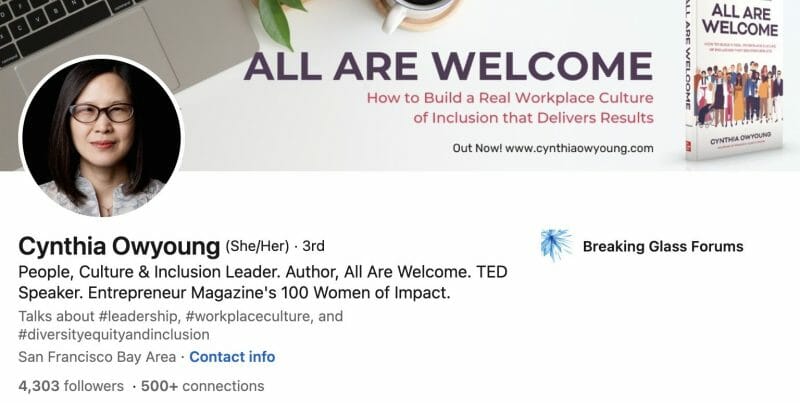
Source: linkedin.com
Before starting Breaking Glass Forums, a partner for businesses that want to boost employee engagement, Cynthia (she/her) was the Vice President of Inclusion, Equity and Belonging at Robinhood. She also served in similar roles at a number of well-known brands that include GitHub, Charles Schwab, and Yahoo.
Boasting 20 decades of experience in diversity and inclusion strategies, she brings a lot of insight and a strong marketing background to the table. In addition to DEI, she also regularly talks about leadership and workplace culture and is passionate about building diverse teams and human-centered cultures.
Her contributions have landed her a spot on Entrepreneur Magazine’s list of 100 Women of Impact in 2021 and thousands of followers on LinkedIn.
9. Ryan Carson, Founder of multiple companies
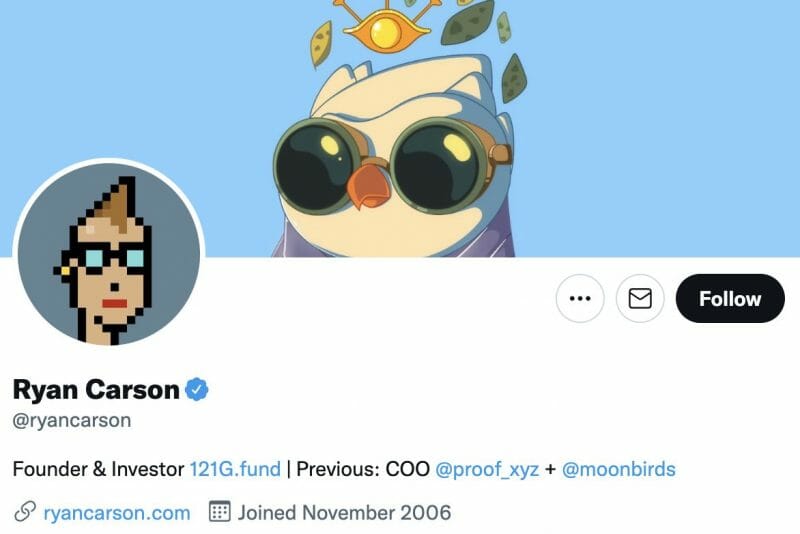
Source: twitter.com
Ryan Carson is a founder and investor. He also recently turned an entrepreneur when he started to focus on building his own personal brand after he sold Treehouse, an online tech school that he founded with his wife to help close the tech talent gap with diverse talent.
While he was running Treehouse, he also signed the Diversity Pledge and came to realize that his own company had mostly white males. Now, he tries to help other businesses build a group of diverse tech talents from scratch and, in doing so, gain a strategic advantage too.
He has spoken at a number of conferences and appeared on various podcasts. For weekly posts, you can catch him on Twitter where he’s very active. He also posts on Instagram from time to time, but rarely shares content on LinkedIn.
10. Joelle Emerson, Founder and CEO at Paradigm
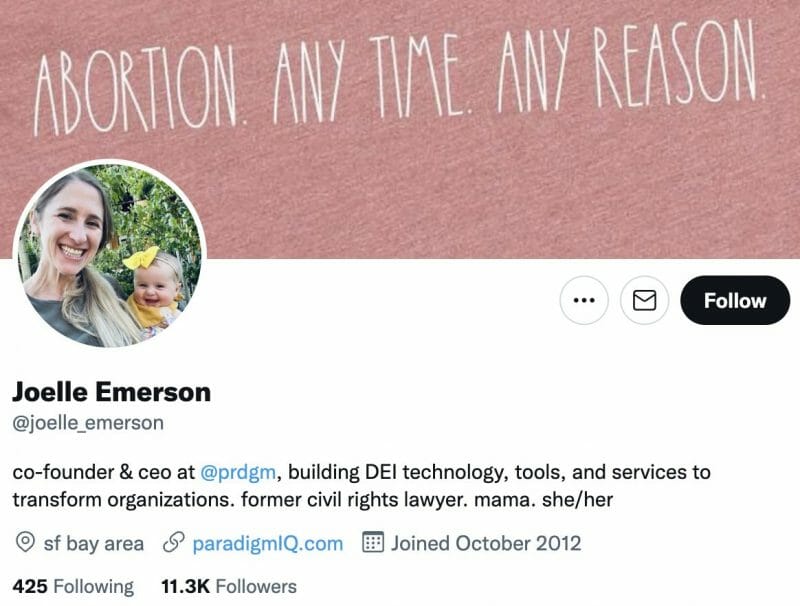
Source: twitter.com
As the founder of Paradigm, a strategy firm that helps businesses to create more inclusive organizations, Joelle has worked with leading brands like Slack, Airbnb, and American Express. Using a data-driven approach, they create evidence-based solutions to help create meaningful changes.
Her interest and passion in promoting diversity started when she worked as a women’s rights employment lawyer. In this role, she helped women with sexual harassment, gender, and other workplace issues.
She’s skilled at identifying barriers, such as unconscious bias and stereotype threat. Just like Ryan Carson, she’s also mostly active on Twitter where she has over 11,000 followers.
11. Aubrey Blanche, Founder and CEO of The Mathpath
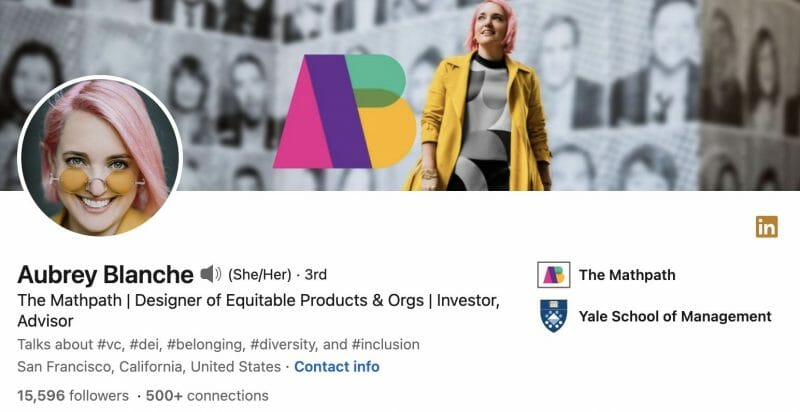
Source: linkedin.com
In 2020, Aubrey (she/her) started The Mathpath, a consultancy that helps businesses to create equitable processes, products, and experiences. Before she shifted her focus to becoming a businesswoman, she held leadership positions at Culture Amp, a market-leading employee experience platform, where she was responsible for designing and implementing DEI strategies.
When she’s not presenting talks about topics relating to belonging, fairness, and bias in recruiting, she’s working with execs and organizations helping them to understand their key role better. Through her one-on-one sessions and group workshops, she’s helped leaders to identify emotional and cognitive barriers that are preventing them from achieving personal transformation.
To learn more about fair talent processes, bias-resistance product design, and equitable algorithmic design, you can follow her on Twitter and LinkedIn where she has over 15,000 followers.
12. Tony Prophet, Board Member of Dolby Laboratories
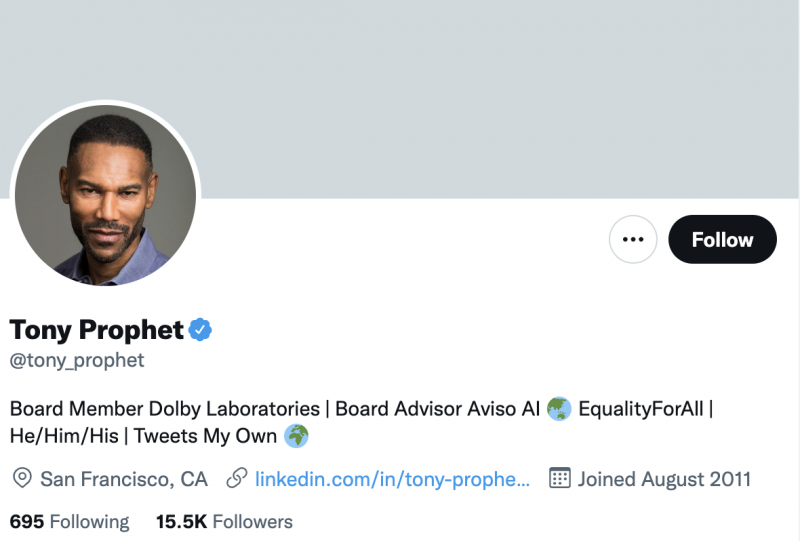
Source: twitter.com
Before joining the board of directors of Dolby Laboratories, Tony guided Salesforce’s global recruiting team to help them create a workplace that promoted inclusion and equality. He’s no stranger to the SaaS and tech industries and has also worked at Microsoft and HP.
He has made a name for himself as a leader in the tech industry who has partnered with companies across various disciplines. Dedicated to promoting equality and inclusion, he walks the talk and has helped to drive systemic change not only in the workplace but also the broader community. As a tech leader, he also helps to ensure that tech is used in a way that’s ethical and humane so that it helps to create positive social change and improve the lives of users.
13. Lesa Bradshaw, Diversity and Disability Inclusion Expert
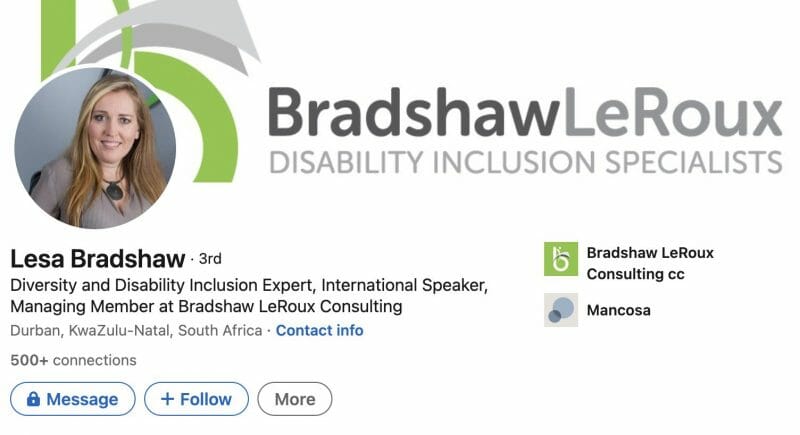
Source: linkedin.com
Lesa founded BradshawLeRoux Disability Inclusion Specialists in the late 90s to help source, assess, and develop talent in a way that’s fair by recognising prior learning and potential. As she’s also a registered psychometrist, assessment is also one of her core fields.
She’s presented a TED talk on disability integration strategies in the workplace (she also completed her MBA thesis on this topic) and her articles have been published in various publications. Combining her professional experience with her personal journey, she helps to create disability inclusive cultures at a corporate, governmental, and societal level. She’s a leading and recognized thought leader who helps to bust stereotypes surrounding disabilities.
14. Max Masure, Justice, Equity, Diversity, and Inclusion Consultant
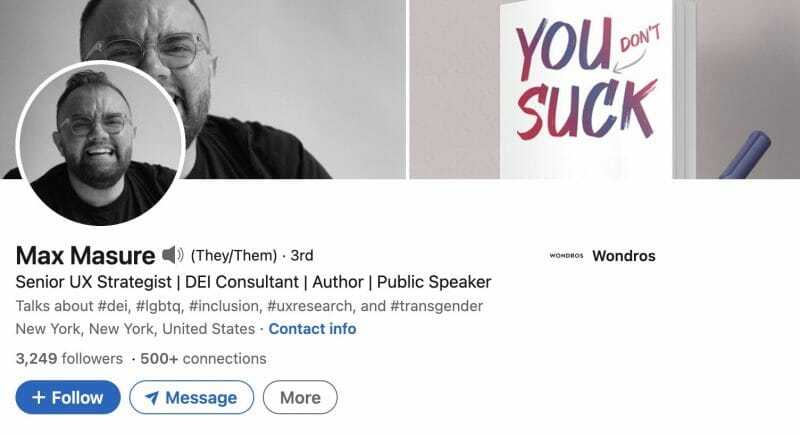
Source: linkedin.com
Max Masure (they/them) is a community-centered, user experience (UX) researcher and designer who focuses on the tech and healthcare industries.
In 2019, 2020, and 2021, Max was named as one of the most impactful leaders in the DEI space. Drawing on their own journey from burnout and misalignment with their inner self, they’ve also written a book on imposter syndrome helping others to improve their work-life balance.
When they’re not designing or writing, Max also presents virtual and in-person workshops that help others to take personal accountability in supporting trans and gender non-comforming customers and workers. You can follow them on Twitter, LinkedIn, or Medium.
Frequently Asked Questions
How do you promote diversity and inclusion in the workplace?
5 ways to promote diversity, equity, and inclusion in the workplace:
- Monitor unconscious bias
- Promote pay equity in the workplace
- Celebrate holidays of all cultures
- Promote mentorship, training and leadership development for all cultures
- Make it easy for others to participate in employee resource groups
What is a DEI influencer?
DEI influencers, or Diversity, Equity and Inclusion influencers, are in charge of inclusion and belonging in the workplace. These leaders and influencers advocate for internal social justice policies and help educate others about DEI issues.
What are examples of diversity and inclusion in the workplace?
One example of diversity and inclusion in the workplace is hiring people from different backgrounds and ethnicities. Another example is giving workers from marginalized communities more opportunities for mentorship, training and development. It’s important to create a safe space where everyone can feel comfortable chiming in and discussing their truest selves.
What is an influencer in the workplace?
A workplace influencer, or employee influencer, is someone within a company that helps positively impact internal and external audiences. These employee influencers will view, interact, and spread opinions about a brand, product or service. They can influence the behavior of audiences.
